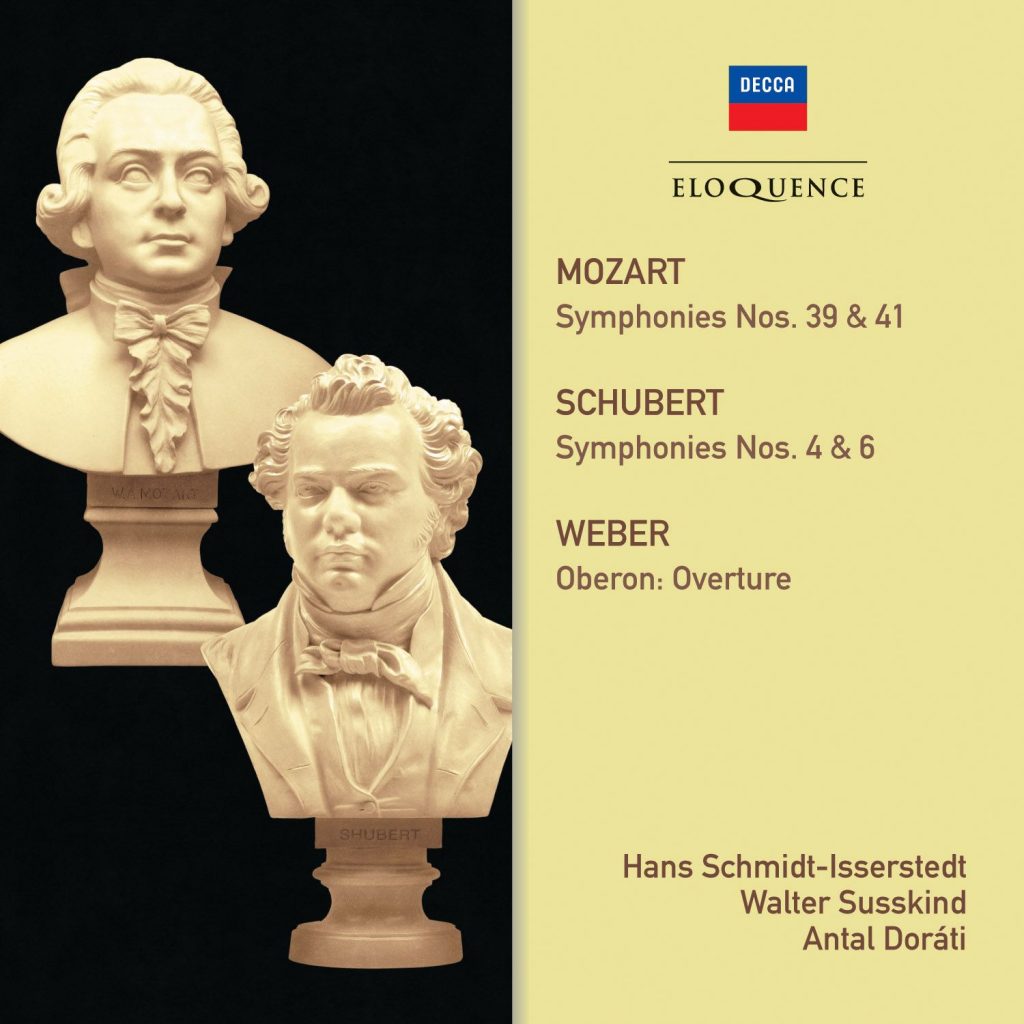‘Like most of the great European conductors,’ wrote the critic Harold C. Schonberg, ‘[Schmidt-Isserstedt] has been brought up in a tradition that insists on selflessness before great music. The aim of conducting, as he sees it, is to bring out the message of the composer and not the skill.’ These virtues distinguish his Mozart conducting above all, including the recordings he made for the Mercury label with the London Symphony Orchestra in 1958.
Schmidt-Isserstedt conducted Mozart with deep scholarly understanding, having written a doctoral dissertation about the Italian influence on Mozart, but reverence never impeded vitality, as the present recording of the ‘Jupiter’ Symphony amply demonstrates. His colleague Wilhelm Brückner-Rüggeberg paid a tribute as acute as it was generous to Schmidt-Isserstedt’s way with Mozart, ‘quite different from the usual apple-crumble cake [Streuselkuchen] or Mozartkugeln. When he conducted Mozart, the music was crystal clear, without false sentiment, but full of beautiful, airy sound.’
Having founded the NDR Sinfonieorchester after World War II and led it on highly successful tours of the UK in politically sensitive times, Schmidt-Isserstedt established a warm working relationship with all the orchestras in London, where he was a frequent and welcome guest until his unexpected death from a heart attack in 1973. He took inspiration from the conducting of Artur Nikisch, which he had witnessed at first hand in Berlin, to persuade orchestras rather than bullying them, and these Mercury recordings document a deep mutual respect between the LSO and their German guest. As on its first release, the Schubert Sixth is coupled with the Fourth conducted by the Czech-British émigré Walter Susskind.
CD 1
WOLFGANG AMADEUS MOZART (1756–1791)
1–4 Symphony No. 39 in E flat major, KV 543*
5–8 Symphony No. 41 in C major, KV 551 ‘Jupiter’*
CD 2
FRANZ SCHUBERT (1797–1828)
1–4 Symphony No. 4 in C minor, D. 417 ‘Tragic’*
5–8 Symphony No. 6 in C major, D.589 ‘The Little’
CARL MARIA VON WEBER (1786–1826)
9 Oberon – Overture*
London Symphony Orchestra
Hans Schmidt-Isserstedt (Mozart, Schubert: Symphony No. 6)
Walter Susskind (Schubert: Symphony No. 4)
Antal Doráti (Weber)
*FIRST INTERNATIONAL CD RELEASE ON DECCA
Recording Producer: Harold Lawrence
Recording Engineer: C. Robert Fine
Recording Location: Watford Town Hall, London, UK, 30 June 1958 (Mozart: Symphony No. 39), 1 July 1958 (Mozart: Symphony No. 41, Schubert: Symphony No. 6), 2 July 1958 (Schubert: Symphony No. 4), 27 July 1962 (Weber)
Original Mercury Living Presence Releases: MG50184 (Mozart): February 1959 / SR90184 (Mozart): October 1959; MG50196 / SR90196 (Schubert): August 1959; SR2 9134 (Weber): February 1971
“Schmidt-Isserstedt’s perfectly chosen tempo for the Allegro of No. 39, his crisp handling of the minuets of both symphonies, his admirably Mozartian and unhurried speed in the finale of No. 39, the light, dancing forte everywhere, are all a pleasure to hear.” Gramophone, August 1959 (Mozart)
“This ‘Jupiter’, in particular, proves most distinguished, with crisp, bracing outer movements, a graceful Minuet, and a singing Andante. And equally significant is the exemplary textural clarity maintained throughout.” Fanfare, July 1979 (Mozart)
“Schmidt-Isserstedt’s readings … would be very hard indeed to beat … They have all the positive musicianly virtues without which many an unaffected reading is merely dull… [an acquisition] you would be unlikely to regret, whatever rival versions appear in the course of time.” Gramophone, August 1960 (Mozart)
“Susskind and Schmidt-Isserstedt have similar ideas about Schubert. They play him in healthy, outgoing fashion. Both of these performances are vigorous and lively … The orchestra plays well for both conductors, and the recording is bright and well-defined.” Stereo Review, December 1959 (Schubert)

